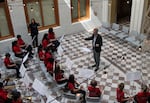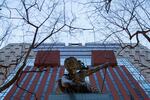This past Tuesday morning, Portland Mayor Ted Wheeler raised his baton, with two dozen faces watching his every move.
People stopped on the stairs, hung over the handrail in the City Hall atrium to watch and listen as Wheeler guest-conducted the kids from BRAVO Youth Orchestras — a program that teaches at-risk kids how to play symphonic music.
“Nobody’s ever asked me to conduct before," Wheeler said, "Probably because most people know I have absolutely no sense of rhythm whatever.”

Portland Mayor Ted Wheeler conducts members of BRAVO Youth Orchestras. BRAVO is one of several dozen organizations — along with hundreds of individual artist — who receive public funding through the Regional Arts and Culture Council.
April Baer / OPB
Every year BRAVO brings its kids to City Hall to remind elected officials that public investments in the arts can make the difference between having this music, or going without.
It was lucky timing for BRAVO to be at City Hall that day. The mayor had just spent the 90 minutes prior hearing what’s not happening with the arts in Portland.
BRAVO, and dozens of other arts groups rely on an agency called the Regional Arts and Culture Council, or RACC, to administer millions of dollars in public money every year. With a budget just under $10 million — the lion’s share of it coming from the city — RACC is no traditional bureau. It was set up to function outside City Hall, for more flexibility.
But the agency is in between directors right now. Wheeler and Commissioner Nick Fish asked the city auditor's office to research and report back on RACC, as a tool to help the incoming director assess the work ahead.
City Auditor Mary Hull Caballero's office delivered a mic-droppingly frank report this week.
“The city may not be getting what it wants,” said Jenny Scott, a senior management auditor for the city, during a public work session Tuesday.
Just to be clear, there’s no malfeasance. But RACC has basically been doing its work without a lot of council oversight. Scott's report cited some basic accounting issues — like the fact that RACC, unlike the bureaus, never submits a full budget to council. Once a year it asks for new money and explains what it’s going to cut back.
Auditors pointed out no one’s keeping tabs on the value of RACC's public art assets. Take the famous Portlandia statue. Sculptor Raymond Kaskey got paid $348,000 by RACC to make it for the city in 1985. Today, it’s worth something like $4 million to $5 million. In case of a disaster, without an updated valuation, the city might not be able to recoup the full value.
Furthermore, the RACC contract is riddled with vague language about the agency's mission, public records procedure and workings. At the top, the agency lacks a strategic plan to guide operations.
Scott noted, “A lack of oversight by the city does not mean work was not completed, but it poses risks."
For example, she continued, the city does not have proof assurance services were provided. But the city can’t intervene if there are service delivery problems and can’t determine if contract changes are needed.

The Portlandia statue sits atop the Portland Building, March 11, 2017.
Bradley W. Parks / OPB
Auditors noted RACC's oversight issues are a two-way street. City leaders have been preoccupied with issues like housing and policing in recent years, and several mayoral administrations have come and gone with no one assigned to oversee RACC’s contract.
The agency pays independent accountants to audit its books every year and no major problems have been reported. But the message was that the city can't really know how RACC is doing, since its mandate and workings are so unclear. At one point during the presentation, Commissioner Amanda Fritz said she’d be very interested in a deeper dive into RACC’s programs, and how they’re delivering.
Commissioner Nick Fish, the council’s arts liaison, said the report "raises a fundamental question: What are the city’s long-term goals for the arts, and how [are] RACC and the city aligned?"
He characterized the recommendations as "very positive."
RACC's mission, Fish said, "is not something we spend a lot of time thinking about. RACC has done a lot of great things. There are things we can implement over the next year. The net goal, I think will be to strengthen public confidence in the money we give to RACC.”
The report might have landed with a softer "thud" if the agency were on firmer leadership footing. One year ago this month, RACC's longtime executive director retired. The first candidate chosen by the board search committee after a lengthy process declined the offer. Linda McGeady is on the recently reshuffled search committee and said the board is confident in its process.
“We were heartbroken that did not work out," McGeady said. "Since the search committee had only officially recommended one candidate to the board, after some careful consideration the board decided we would just continue our search.”
This makes for frustration among some of the artists and arts groups who've already invested in the search. Toni Tabora Roberts is a member of the group Arts Workers for Equity, a coalition of mid-career arts administrators, most of whom are people of color. AWE intervened in the search process nine months ago to ask for changes that would attract a more diverse range of candidates.
Roberts — who, full disclosure, worked some years ago for OPB — said AWE will keep an eye on the search. The group has some reservations about what’s different this time.
“We are concerned the current search committee is only going to be current board members," Roberts said. "We don’t believe that’s the best way forward.”
Beyond the executive search, the question stands: When and how will the agency’s relationship with the city be redefined? The city recently dedicated money to fund a contract administrator for RACC. Fish will likely be the one to spearhead a review of the contract, but no one’s saying yet when that will happen.
RACC’s board chair, Portland Timbers President Mike Golub, said, “It’s really not our decision, it’s the city’s, but we welcome deeper engagement at the city, strengthening the partnership, but the timing is up to the city.”
RACC’s contract with the city expires at the end of June. It seems likely the contract will be extended until a new executive director is in place. The search committee hopes to hold meetings in June to talk about creating a new pool of candidates.

